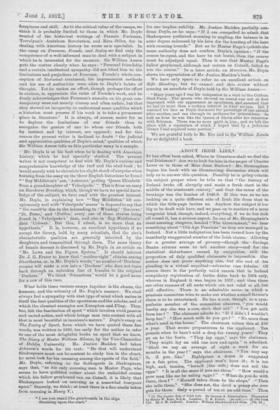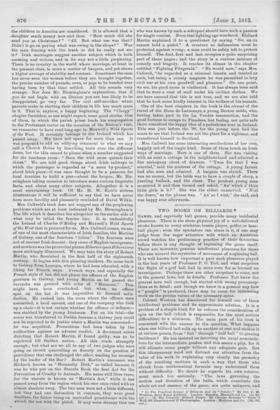ABOUT IRISH , 141FE4'.*
IT has often been asked, Where in literature shall we find the real Irishman ? Are we to look for him !in therages of 'Charles Lever or iu those of Miss Jane Barlow? Mr. Birmingham begins his book with an illuminating discussion which will help us to answer this question.;Possibly he is going outside his subject proper when he- tells .us that "the the. history of Ireland broke off abruptly and made a fresh start in. the middle of the nineteenth century," and that cause of the breakage was the famine of 1846.8. If this was so we are looking on a quite different side of Irish life from that to which the title-page invites us. Anyhow the subject fs too big to be dealt with here, and we pass on to matters of a more congenial kind, though, indeed, everything, if we do but look all round it, has a serious aspect. In one of Mr. Birminghain's most amusing chapters, headed "•The :Government," we hear something about " Old-Age Pensions " as they are managed in Ireland. Not a little indignation has been roused here by the manifestly exaggerated number of the Irish claims. Allowing for a greater average of poverty—though the Savings Banks returns seem to tell another story—and for the statistical disturbance caused by emigration, still the proportion of duly qualified claimants is impossible. OUr author does not prove anything else, but the end of hie pleading is a virtual acquittal—solvunger rise tabulae. Of course there is the perfectly valid reason that 'in Ireland compulsory registration of births dates back to 1864 only, whereas in England it was begun in 1837; and then there are other reasons of all aorta which are not valid at all, but still effective, There is an admirable' scene, in which a pensions committee tries to make out whether a small.farmer's claim is to be entertained. He has a cow, though, as a sym- pathetic member of the committee observes, " you would hardly say she was a cow, she's that old." " You get milk from her ? '! The claimant admits it 4 " If I didn't I wouldn't keep her." "How much milk do you get ? " "No more than what's used in the house." The chairman values this at i10 a year. That seems preposterous to the applicant. Ten pounds when he hasn't sold a drop for twenty years ! They go on to the fowls. "They lay eggs," says the chairman. "They might lay an odd. one now and again" is admitted. " Shall we say an average of eight a week for six months in the year?" says the chairman. "You may say it, if you like." Eightpence .wa,etd j dozen es ia e nilto,t it el is too the as a fair price. ThehearsPeplflicaEtitme woulf
high, and, besides, "herself
eggs." " It is all the same if you eat them." " How would a poor man like me be eating eggs ? " Whatelo you do with them, then ? " "Herself takes. them to the shops." • "Then she sells them." "She does:not, the devil a penny, ehe ever gets for them. Only a' pound of tea, at. an-odd time." Then • (1) The Lighter Side of Irish Life. By George A. Birmingliam. Illustrated by 'Henry W. Kerr, Loudon: T. N, Fonlis. [5s. uet.)—(2) Old Irish Life. By J. Loudon : William Blackwood. and SOUS. 0011. 43d.3
,the children in America are Considered. It is allowed that a .daughter sends money now and then. "How much did she send you at Christmas P" " 22. But what use was that ? Didn't it go on paying what was Owing in the shops ?" Was the man fencing with the trath or did he really not see 'it ? Irish marriages suggest another subject which is both amusing and serious, and in its way not a little perplexing. There is no country in the world where marriage, at least in the peasant class, is more a matter of bargain, and yet shows a higher average of stability and content. Sometimes the man has never seen the woman before they are brought together, ;the precise number of pounds, cows, or pigs to be handed over having been by that time settled. All this sounds very strange. Nor does Mr. Birmingham's explanation, that if you do not begin with an illusion you are less likely to be disappointed, go very far. The real self-sacrifice which parents make in starting their children in life has much more in it. That is, anyhow, a happy beginning. The "Clergy " chapter furnishes, as one might expect, some good stories. One of them, in which the parish priest lends his congregation to the Protestant rector on the occasion of the Bishop's visit, we remember to have read long ago in Maxwell's Wild Sports
of the West. It certainly belongs to the Ireland which has
• passed away. We have not space for more than one. It was proposed to add an edifying ornament to what we May call a Church House by inscribing texts over the different doors, but the idea ceased to please when a member suggested for the luncheon room : " Here the wild asses quench their thirst." We are told good things about Irish railways in .which the passenger is regarded as "a mere by-product," . about Irish piers—it was once thought to be a panacea for local troubles to build a pier—about the brogue, Mr. Bir- mingham taking occasion to introduce some curious linguistic facts, and about many other subjects. Altogether it is a most entertaining book. Of Mr. H. W.. Kerr's sixteen illustrations it will be sufficient to say that we have never been more forcibly and pleasantly reminded of David Wilkie.
Mrs. Callwell's book does not suggest any of the perplexing problems which are at least indicated by Mr. Birmingham's. The life which it describes lies altogether on the earlier side of what may be called the famine line. It is undoubtedly the Ireland of Charles O'Malley and Maxwell's Wild Sports of the West that is pictured for us. Mrs. Callwell comes, we see, of one of the most characteristic of Irish families, the Martins of Galway, one of the fourteen " tribes." The fourteen were not of ancient Irish descent : they came of English immigrants; and nowhere was the proverbial phrase Hibernia spills Hi berniores . more strikingly illustrated. We may take the story of Robert
• Martin, who flourished in the first half of the eighteenth century. It begins with this pleasing incident. He came back 'to Galway from Louvain, where he had been educated, with a liking for French ways. French ways, and especially the French style of hat, did not please the officers of the English
• garrison in Galway, and young Martin as he passed the barracks was greeted with cries of " Macaroni." This ,might have been overlooked, but when an officer spat on the hat it was imperative to demand satis- faction. He rushed into the room where the officers were assembled, a broil ensued, and one of the company who took up a chair—it is not certain whether for offence or defence— was stabbed by the young Irishman. Put on his trial—the venue was transferred to Dublin because a Galway jury could not be expected to do justice where a Martin was concerned— .he was acquitted. Precautions had been taken by the authorities against an adverse verdict. A document exists directing that Robert Martin, if found guilty, was to be reprieved till further notice. All this reads strangely enough ; but what are we all to say of two judges who were going on circuit quarrelling so fiercely on the question of :precedence that one challenged the other, sending. his message by the leader of the Bar P Robert Martin's successor was :Richard, known as " Humanity Dick," so called because it was he who put on the Statute Book the first Act for the .Prevention of Cruelty to Animals. His name still lives there, :for the statute is known as "Martin's Act," while it has passed away from 'the region which his race once ruled with an .almost absolute sway. The two men were not a little different, but they had one distinction in common, they were great eduellists, the father being an unrivalled practitioner with the sword, the son with the piitol. It may seem Strange that-one who was known by such a sobriquet,should have such a passion for single combat. Even that fighting age wondered. Richard Martin explained it to a questioner by saying, " Sir, an ox cannot hold a pistol." A creature so defenceless must be protected against wrong; a man could be safely left to protect himself. The duel, that and last, occupies a quite surprising part of these pages ; and the story is a curious mixture of comedy and tragedy. It reaches its climax in the chapter entitled " Fighting Fitzgerald." " He would now," says Mrs. Callwell, "be regarded as a criminal lunatio and treated as such, but being a county magnate he was permitted to levy civil war at his own goodwill and pleasure." On one point, we see, his good name is vindicated. It has always been said that he wore a coat of mail under his civilian clothes. We are here assured that this is not true, and we are also told that he took some kindly interest in the welfare of his tenants.
One of the best chapters in the book is the rdsund of the travel of the Sieur de Latocnaye, a young Breton noble, who, having taken part in the La Vendee insurrection, had the good fortune to escape to Flanders, but feeling not quite safe there conceived the happy idea of a pedestrian tour in Ireland. This was just before the '98, for the young man had the sense to see that Ireland was not the place for a sightseer, and transferred himself to Scotland.
Mrs. Callwell has some interesting recollections of her own, happily not of the tragic kind. Some of them touch on Irish ways of marriage. Here is one of them. She was visiting with an aunt a cottage in the neighbourhood and admired a fine mahogany chest of drawers. " 'Twas for that I was married," said the mistress of the cottage. A young farmer had also seen and admired. A bargain was struck. There was no money, but the bride was to have a couple of sheep, a yearling bullock, and the chest. The prudent young man measured it and then turned and asked, " An' which o' thim little girls is it ? " She was the eldest unmarried. " Nixt the doore," as the phrase was. " An' so I wink" she said, and was happy ever afterwards,







































 Previous page
Previous page